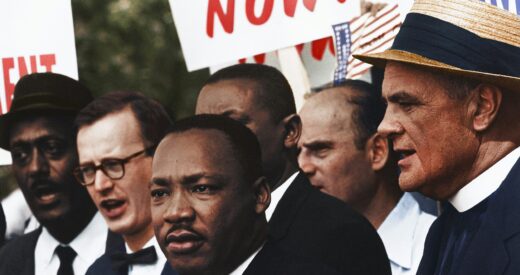Trailblazer. Award-winner. Legend.
Few individuals are able to both transform their fields and make a lasting impact on American history. Looking back on the legacy of Sidney Poitier (who died on January 6 at age 94), the unwavering dignity of the person shines through, but the grace he demonstrated while in the public crosshairs reveals the quality of Poitier as an individual.
According to journalist Tim Gray, “Every artist hopes to make the world a better place. Sidney Poitier actually did.”
Poitier’s career of more than fifty years in front of the camera was a testament to determination in the face of lingering racism and bigotry. When he kissed Katharine Houghton in Guess Who’s Coming to Dinner (1967), for example, the Supreme Court ruling against miscegenation laws had only been in place for a matter of months, and 17 states had laws against interracial marriage still in place.
Beginning in the late 1940s, Poitier not only showed audiences in America and abroad that a Black actor could be dignified, intelligent, and sensitive but also that, by doing so, he could bend the will of Hollywood executives who were still nervous about giving lead roles to Black actors because of fear about backlash in the South and Midwest. Poitier presented viewers with a different perspective when most African American actors up until that time were afforded roles based mainly on stereotypes, caricatures, and cartoonish figures. Standing at the forefront of this movement, Poitier made himself a target for critics who didn’t want to see Black people on film in meaningful roles and also for others who wanted him to push even harder for equality.
Imagine the scene in 1958 when Poitier became the first Black actor nominated for a Best Actor Oscar for The Defiant Ones. Reverend Martin Luther King Jr. had created the Southern Christian Leadership Conference (SCLC) only one year before. And his nomination came just one year after the Civil Rights Act of 1957 as well – the first law regarding civil rights to pass through Congress since Reconstruction. In nearly a century since the end of the Civil War, it could be argued that the U.S. had made little substantial progress toward equality. Yet, Poitier waded into this environment more or less alone among Black lead actors.
Five years later, in 1963, Poitier won the Academy Award for Best Actor for Lilies of the Field. Even then, however, the actor openly wondered whether he was simply a token for Hollywood to pat itself on the back for giving him the honor. Few Black actors were offered major roles, even after Poitier ostensibly broke the Oscar barrier.
By the end of the 1960s, Poitier was a major box office attraction but was criticized by activists for not taking on roles that were more realistic of the Black experience in America. The actor countered by impressing upon observers that his deep moral conviction was valuable to viewers regardless of his or their race. Poitier also used his power in Hollywood behind the scenes to expand opportunities for other Black people, demanding for instance, that half the film crew for The Lost Man (1969) be Black.
Poitier continued to broaden the public perception of what success looked like for a Black artist well into the twenty-first century. Upon news of his passing, President Joe Biden wrote: “With unflinching grandeur and poise – his singular warmth, depth, and stature on-screen – Sidney helped open the hearts of millions and changed the way America saw itself.”
The President’s words exemplify what makes Sidney Poitier such an important figure in American history. Across the ages, when many people had little interaction with Black people or even attempted to understand non-White cultures in America, Poitier graced the screen with dignity and sensitivity, thereby bringing a new perspective to viewers around the world.
In addition to serving as Director, Business Intelligence & Content Strategy at The Diversity Movement, Bob Batchelor is an award-winning cultural historian and author of 12 books, including Stan Lee: The Man Behind Marvel.






